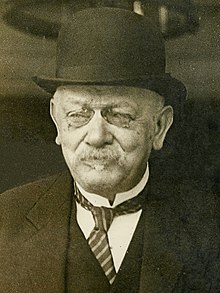Jules Cambon
Jules Cambon | |
|---|---|
 | |
| Born | 5 April 1845 Paris, France |
| Died | 19 September 1935 (aged 90) Vevey, Switzerland |
| Occupation | Diplomat |
| Relatives | Paul Cambon (brother) |
Jules-Martin Cambon (5 April 1845 – 19 September 1935)[1] was a French diplomat and brother of Paul Cambon. As the ambassador to Germany (1907–1914), he worked hard to secure a friendly détente. He was frustrated by French leaders such as Raymond Poincaré, who decided that Berlin was trying to weaken the Triple Entente of France, Russia and Britain and was not sincere in seeking peace. The French consensus was that war was inevitable.[2][3]
Biography

Cambon began his career as a
Cambon was nominated French ambassador at
Cambon was transferred in 1902 as ambassador to Spain and in 1907 to Germany, where he served until the outbreak of
Secrecy surrounded the issue of a
In 1928, he published what became a classic study of diplomacy, Le Diplomate, which was translated into English, Spanish, German, and Russian, and in it, he wrote, "What really distinguishes the diplomatist from the common herd is his apparent indifference to emotions; he is compelled to carry professional reserve to lengths which seem incomprehensible".[8]
His brother, Paul, was also a notable French diplomat.
See also
References
- ^ "Jules Cambon (1845-1935)". Bibliothèque nationale de France. Retrieved 3 April 2022.
- JSTOR 2639084.
- ISBN 978-0312302931
- ^ Tabouis, Genevieve R. (1938) The Life of Jules Cambon.
- JSTOR 24911417.
- ISBN 978-0812976038
- ^ Barr, James (2012) A Line in the Sand: The Anglo-French Struggle for the Middle East, 1914–1948.
- ^ Cambon, Jules (1931). The Diplomatist. Translated by Turner, Christopher Rede. London: Philip Allan. p. 3.
Sources
- Keiger, John (1983). "Jules Cambon and Franco-German Détente, 1907–1914". The Historical Journal. 26 (3): 641–659. doi:10.1017/S0018246X00021099. online
- Jules Cambon, The Diplomatist, trans. Christopher R. Turner. London: Philip Allan, 1931.
External links
- Cambon, Jules. France and the United States: Essays and Addresses (1903) online
- Library of Congress
- Works by Jules Cambon at Project Gutenberg
- Works by or about Jules Cambon at Internet Archive
- Works by Jules Cambon at LibriVox (public domain audiobooks)

- Newspaper clippings about Jules Cambon in the 20th Century Press Archives of the ZBW
